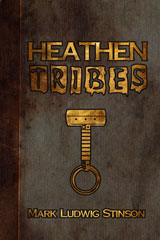

Is there someone there you don't want to be around, or don't want to have any contact with? Is there someone you don't know yet who is drinking too much, visibly angry, or looking like they might cause trouble? What is the tone or mood of the room or environment? Is this a safe place for you to be, or do you need to take precautions to make sure you are safe? When you attend a party, a social gathering, or an event with lots of people.you should be aware of who is present, who is in the room, who is near you, etc.

In a modern context, the stanza works in a literal sense. It is certainly a warning to "look before you leap." Be aware of the dangers and keep your eyes open for them. In very simple terms, the stanza is telling us not to be a naive moron stumbling unknowingly into trouble. Even an unseen or unrecognized foe among people you are meeting and encountering. Anytime you are encountering a situation or people that are outside your trusted inner circle, you should keep you eyes open to the possibilities that a "foe" may be nearby. For me, the stanza applies to more then just entering strange doorways. The stanza suggests we live in a somewhat dangerous world, and that being cautious and truly considering those dangers is well worth your time. It warns us to look this way and that before entering, because you never quite know what dangers might be waiting for you in there (in the form of foe or foes).

In a fairly straight-forward way, this stanza is telling us to be cautious when entering a hall or building. Have they eyes about thee when thou enterest

Watch out and check all gates before faring forth. The man who stands at a strange threshold,įor little he knows | where a foe may lurk,īellow's Note: This stanza is quoted by Snorri, the second line being omitted in most of the Prose Edda manuscripts. Read the translations for yourself and our analysis, but also seek out varied sources and come to your own conclusions. The discussion and analysis presented after these translated stanzas is our opinion.


 0 kommentar(er)
0 kommentar(er)
